Today was a weekly off-day and we went to the historic street of Baghdad — Rashid Street and the celebrated book market on the Mutanabbi Street. It was very hot with the temperature around 46°C (or 115°F) then and we were walking down the street. We thought to refresh ourselves with some hot tea in the famous, historic café.
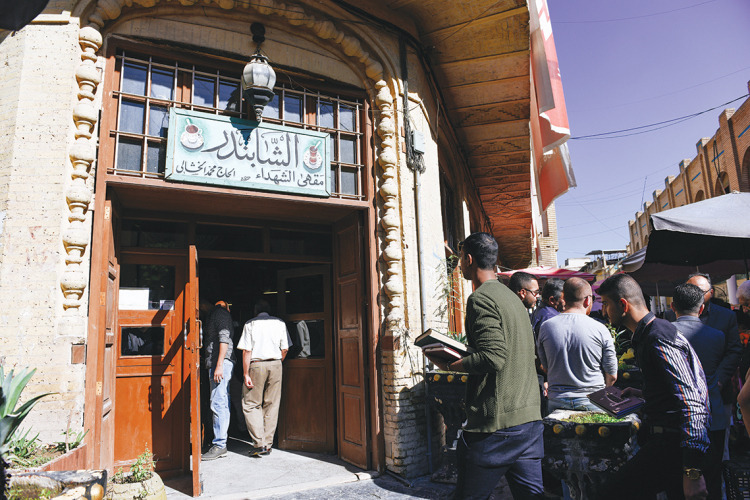
The smell of hot tea in istikan and smoke from shisha pipes greeted us as we entered the café. The café offers the lemon tea brewed the traditional Baghdadi way and the shishas.
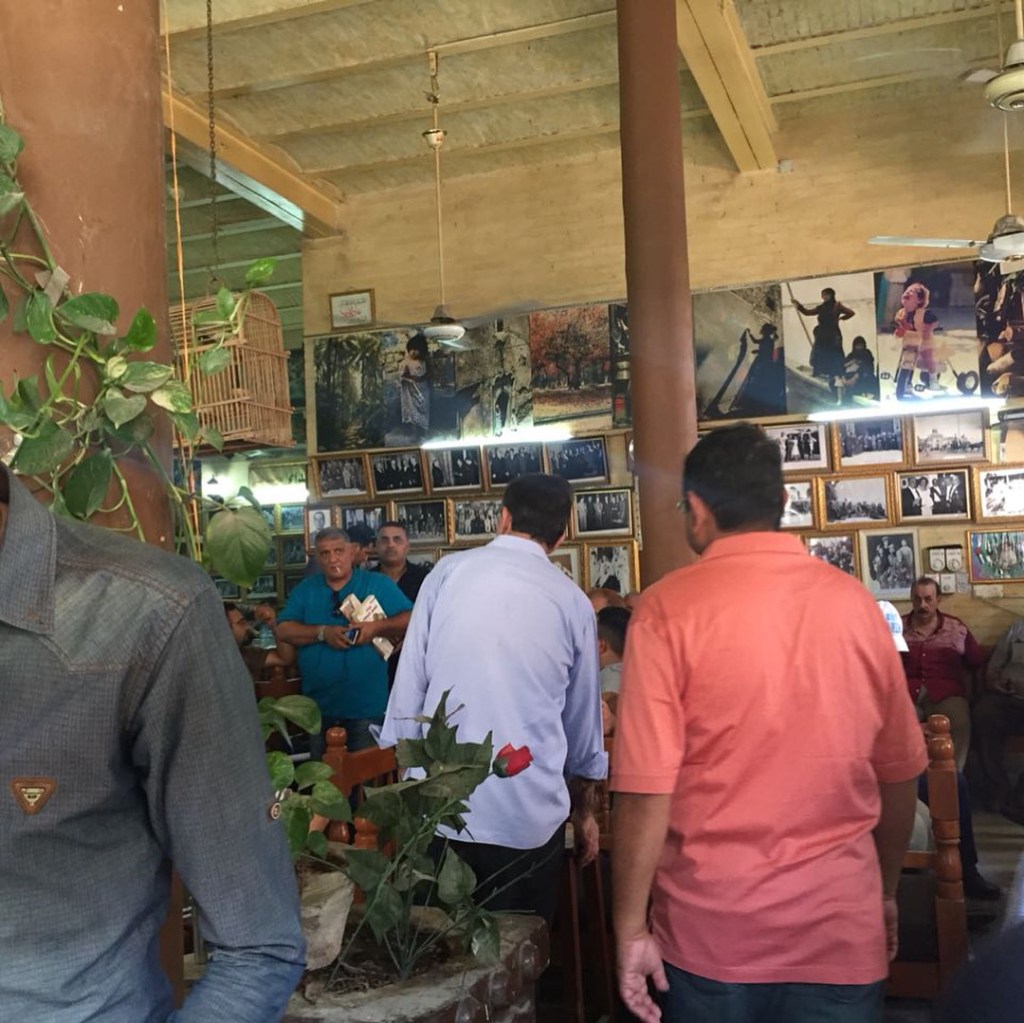
Since opening its doors, Shahbandar café had become a hub of Baghdad’s intellectual life, drawing poets, and politicians to its wooden benches and photo-lined walls. For decades, the cafe has been a hub for writers, poets, journalists, politicians, and activists, who come here to discuss the society, politics, philosophy, cinema, poetry and arts of Iraq and beyond.

The café has witnessed many historical events and changes in the country, and it has also been a source of inspiration and creativity for many artists.
ADDA
This place is typically for adda. Adda is and has been an integral part of the Bengali culture and it is the life-blood of the Bengali community. It is a quintessential aspect of Bengali culture. Bengalis are known for their uncanny propensity to spend endless hours in adda sessions. Adda has spread to other parts of India with the migration of Bengalis.
Adda emerged as a salon-like gathering at which thoughts and persuasions of the day could be discussed in a good-natured, if sometimes vociferous, manner. And over time adda travelled from its acknowledged birthplace of Kolkata to other places, Dhaka and beyond into Greater Banglasphere.
Sudeep Chakravarti

The closest English word that can describe the essence of adda is chat or gossip. It’s a friendly, casual conversation at an informal gathering of like-minded people, who want to talk their hearts out as a means of relaxation during leisure hours. The word adda exists in other Indian languages, but without its unique Bengali connotations.
I have noticed Baghdadis also have the similar propensity of spending endless hours in adda sessions. Like Bengalis, Iraqis are also fanatically fond of adda.
Cultural cafés and teahouses constituted a substitute for clubs and forums that did not previously exist. Over decades these meeting places became an important part of Iraqi life in general and of Baghdad life in particular. The origin of the tradition to regular intellectual dialogues is traced back to Ancient Greece at the time of Socrates and Plato. According to historians, the first Baghdad café, the Khan Jahan, was established in 1590 under the Ottoman rule.
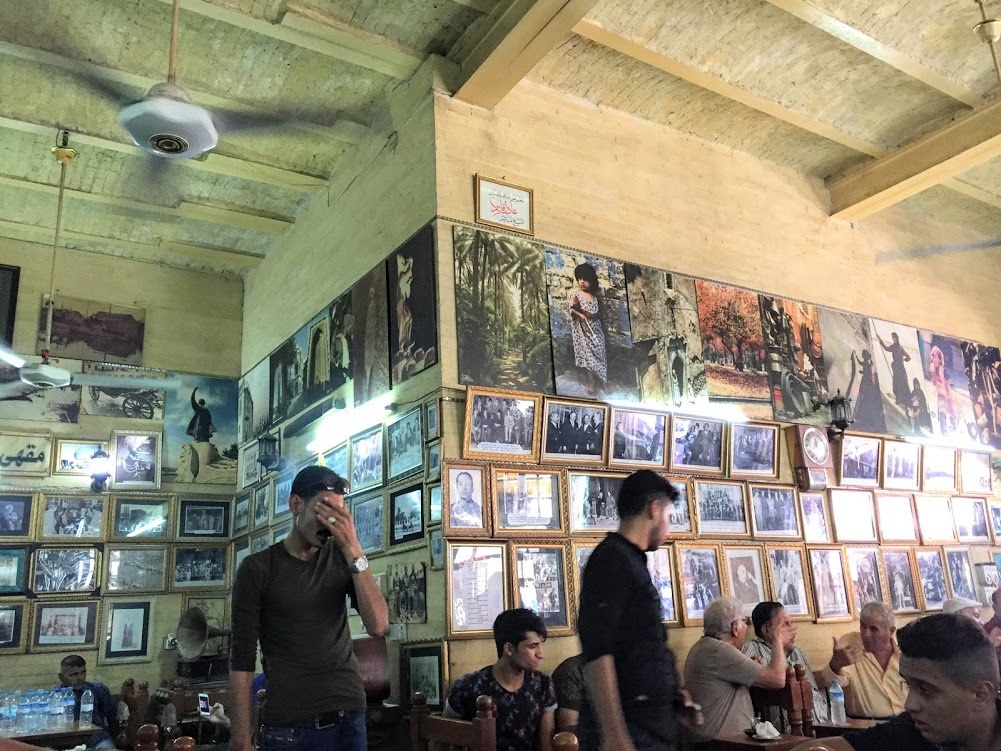
Scores of black and white photographs covering the walls of the café offer a glimpse into the history of Baghdad and Iraq, chronicling some of its leading lights including the portraits of Khalil Pasha, the last Ottoman governor of Baghdad, King Faisal I (reigned 1921–1933), and several ministers from the royal period, as well as many other celebrities.
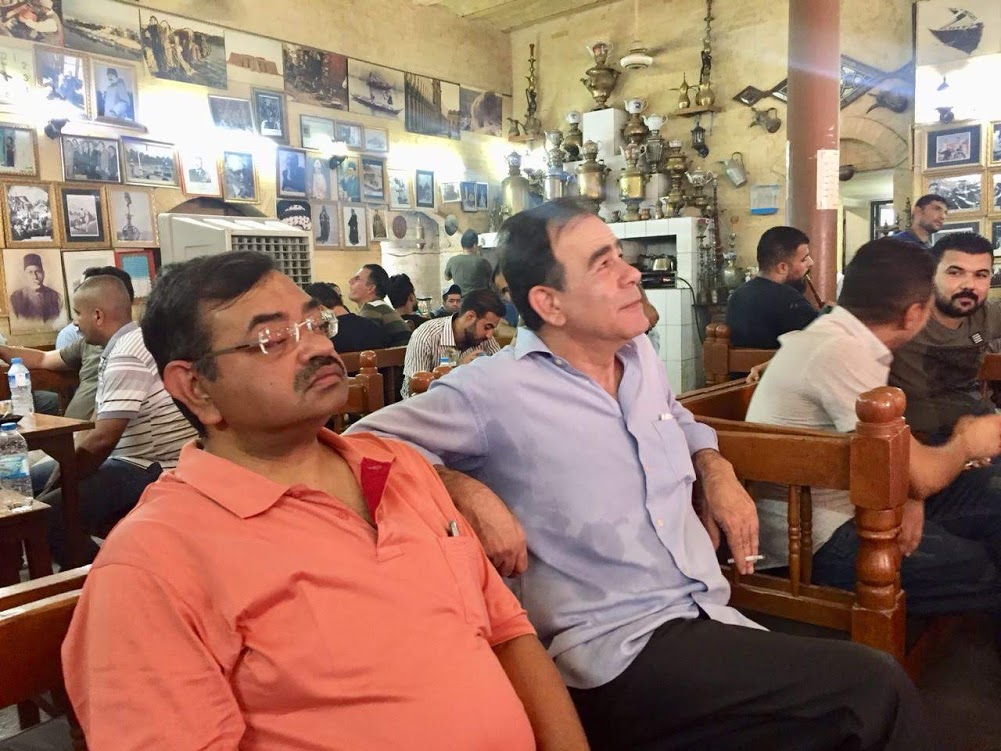
Antique brass tea decanters, old hot water samovars, and wood furniture, in addition to pictures of Ottoman pashas, King Faisal II and Iraqi poets and artists that adorn the walls bestow an attractive ambiance reminiscent of the “good old days” of the city.

When it first became a café in 1917, the brick and plaster building was already a local institution as it housed the printing press of merchant Abdel Majid Al-Shabandar. Shahbandar was the title used to be given to the head of merchants or to the head official of a port during the medieval period.
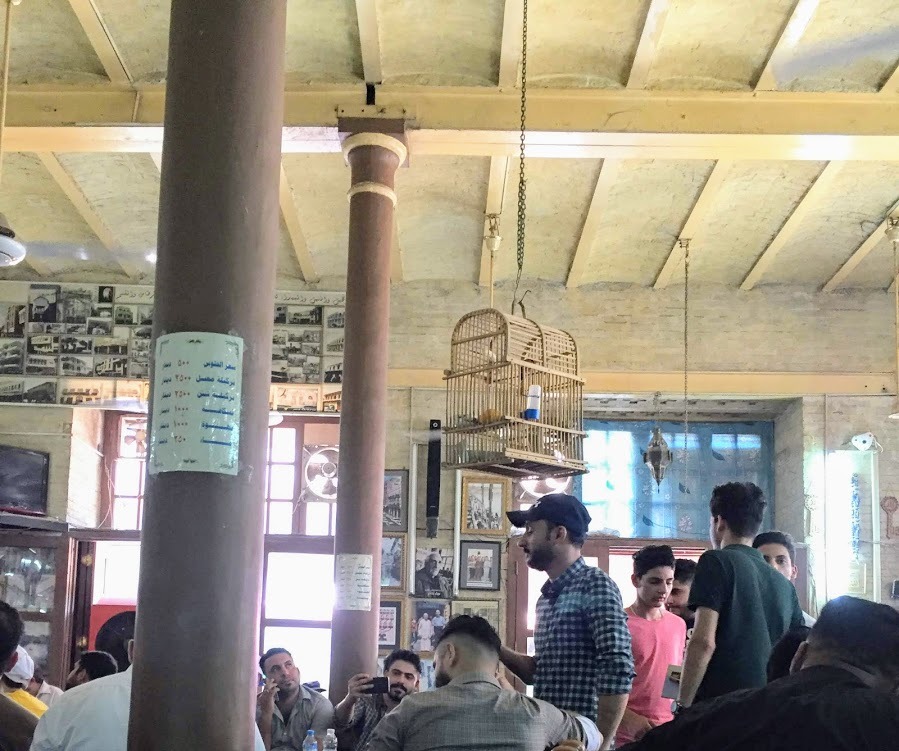
From British rule to modern-day Iraq, Shahbandar has lived through the birth of a nation, the toppling of its monarchy, decades of domination by Saddam Hussein, the drama of the US-led invasion and the bloody chaos that followed.
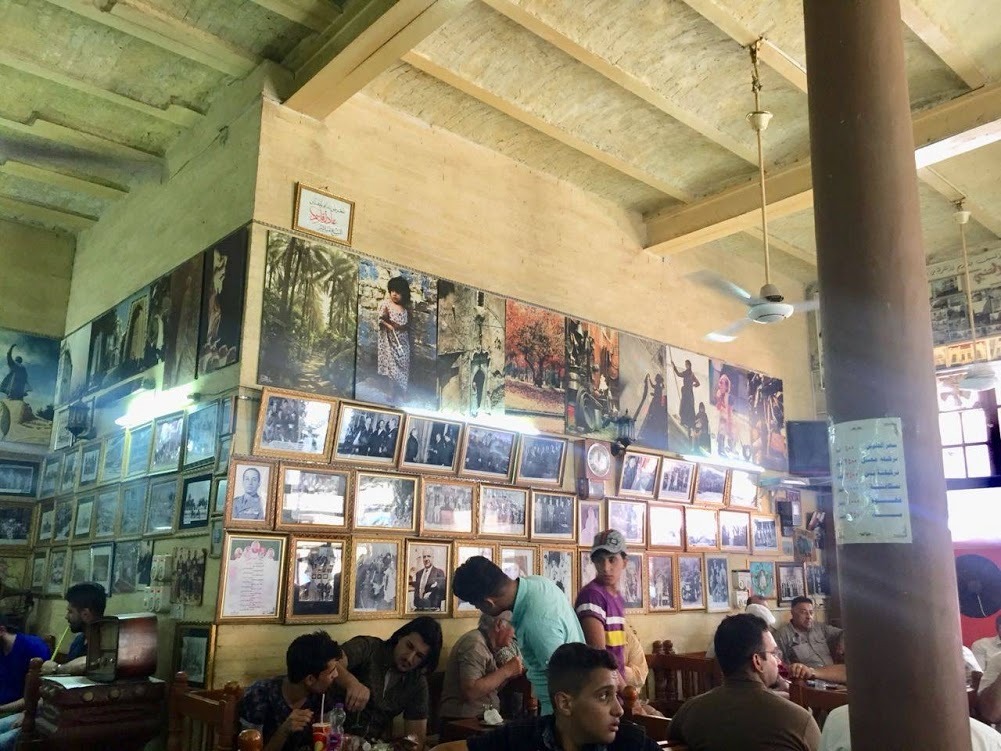
The March 5, 2007 car blast devastated the book market along Mutanabbi Street and also tore through the café, killing more than 30 people and over 100 injured. The café’s owner lost four of his sons and a grandson in the attack. The café still stands, a testament to the resilience of the country and the capital, Baghdad, even if so much has happened here. Shahbandar café is one of Baghdad’s few remaining traditional cultural cafés.
If you are ever in Baghdad, I highly recommend you to visit Shahbandar Café and experience its unique charm and heritage. It is a place where you can learn a lot about Iraq’s culture and history, as well as meet some interesting and friendly people. It is also a place where you can feel the pulse of Baghdad’s intellectual life and join the conversation. Shahbandar Café is more than just a cafe, it is a legend.

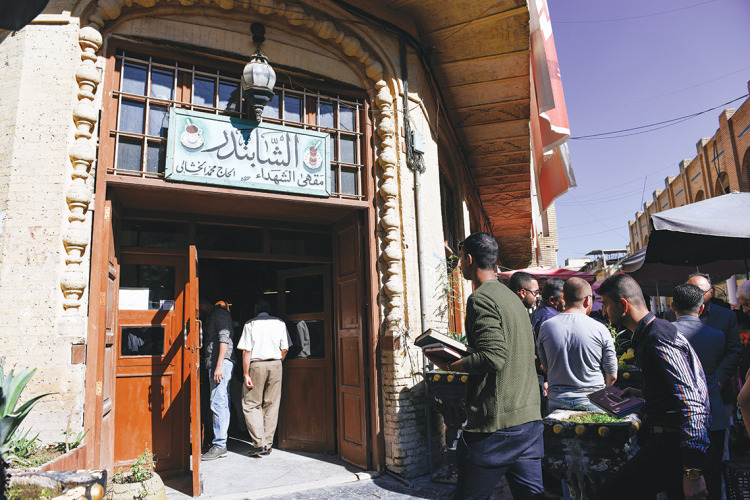
Looks like a great place to sit and converse and debate. Looks historic
LikeLiked by 1 person
Yes Arvind, it has a very distinct atmosphere and nobody bothers you there if you sit for hours sipping tea or smoking shisha.
LikeLike
That’s luxury considering how most modern cafe’s treat you in such a scenario.
LikeLiked by 1 person
Absolutely, Arvind. Time is abundant in Iraq.
LikeLiked by 1 person
🙂
LikeLiked by 1 person
We all need an adda – Cafe, Kahwakhana, Tea House, Coffee House or a Bar. Don’t see women here? Same old ideas about gender?
LikeLiked by 1 person
You’re right, adda is a common feature all over the world. There’s no gender discrimination in this cafe. Women are also welcome here.
LikeLike
Seems like a nice place to sit for hours doing nothing and simply watching humanity (my favourite hobby). What kind of foods n drinks are they serving?
LikeLiked by 1 person
चाय, चर्चा और शिशा
सिर्फ़ इसीका है नशा!
🙂 🙂 🙂
LikeLike
Looks a great and interesting place!
LikeLiked by 1 person
Yes, indeed. Thanks for dropping by.
LikeLiked by 1 person
You have such wonderful pictures. They say so much.
LikeLiked by 1 person
Thanks, Georgia.
LikeLike
How I wish I was there ~ wonderful post, incredible photos of life.
LikeLiked by 1 person
Thank you!
LikeLike
The place seems to have a relaxed ambience about it. Though no women can be seen in the pictures.
LikeLiked by 1 person
Yes, this place is quite a relaxed one and quite fit for adda. 🙂 Although there is no restriction for women here, their number is generally negligible.
LikeLiked by 1 person
Nice story to read about that great cafe which stands as witness to the historic events of that country. ,
LikeLiked by 1 person
Thanks, Anil.
LikeLike
A mixture of old traditions and new ideas. Looks like a cozy place to enjoy with friends… 🙂
LikeLiked by 1 person
Yes, it’s a nice place for adda. Nowadays such places are vanishing as we are getting more into virtual adda… WhatsApp group, etc.
LikeLiked by 1 person
Unfortunately, it’s true…
LikeLiked by 1 person
Seems to have an ambience like one of the vanishing Irani cafes in Mumbai.
LikeLiked by 1 person
Yes, we are now moving more into a virtual world… missing the old virtues. 😜
LikeLike
Pingback: Shahbandar Café | A Cultural Café in Baghdad — INDROSPHERE – gulp & nibble
Looks like an interesting place!
LikeLiked by 1 person
Yes, it’s indeed an interesting place. Thanks.
LikeLike
Hello Sir. Fantastic to see how you covered Shabandar. Please do enlighten us on what varieties of tea they serve there? Is it just cardamom tea or do they also have other varieties. Thanks 🙂
LikeLiked by 1 person
Thanks, Raj. Tea is mostly drunk black in Iraq and drunk throughout the day. Also in Iraq is popular tea prepared from dried lime – Noomi Basra.
LikeLike
Sir Many thanks for your response. I am a student of Arabic culture and the language and I find your Iraq articles highly enlightening! I’ve also been told that cardamom tea is the quintessential ‘Shaayi Al Iraqi’. Did you happen to taste any during your trip? Also, would you know if mint tea is popular in these cafes like it is in the Maghreb or in other regions of the Arab World? Thanks again 🙂
LikeLiked by 1 person
Yes, Raj, cardamom is used too, but mint tea is not that popular. The black tea is consumed whole day and next popular is basra nemoon tea. I have tasted all these tea in Baghdad. It’s good to know that you’re a student of Arabic culture and language. I wish you study this culture scientifically; it’s an amazing culture.
LikeLike
Sir the info you provided was indeed, deeply gratifying, thanks so much! I would say you are truly blessed to have had all these unique experiences, even Karbala Shareef. I wonder if you experienced any attars in Iraq. Though it’s not particularly famed for fragrances, they do have some nice varieties available.
LikeLiked by 1 person
🙏
LikeLike
I wonder if you visited the famous Multaqa Al Ustoora Umm Al Kulthum on Al Rasheed Street? It is another famed tea house in Baghdad like Al Zahawi. Very vibrant and a literary hub as well 🙂
LikeLike
I haven’t visited any place with that name.
LikeLike
On your next trip maybe you could visit these cafes 🙂 They’re all historic, just like Shabandar.
LikeLiked by 1 person
Addas – Cafes, Kahva Khanas, tea stalls all getting closed everywhere I think. Uncomfortable times.
LikeLiked by 1 person
Yes, very uncomfortable times. Hoping that this period would go over sooner than it’s predicted. Praying for no more waves.
LikeLike
Greeat reading this
LikeLiked by 1 person
Thanks, Anne.
LikeLike